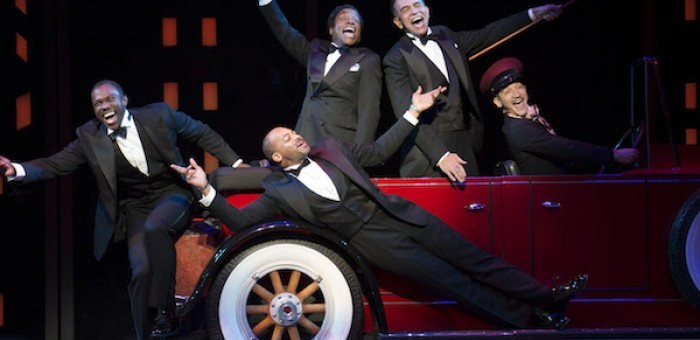Jan 13, 2026 2:09 PM
More Trump-Kennedy Center Cancellations
The fallout from the renaming of the John F. Kennedy Center for the Performing Arts to include President Donald…

Joshua Henry, Brandon Victor Dixon, Billy Porter and Brian Stokes Mitchell, with Richard Riaz Yoder, in a scene from Shuffle Along.
(Photo: Julieta Cervantes)Between the passages of exposition—which check off the facts with academic precision—35 musical numbers set the narrative on fire with the kind of jazz-a-matazz that lifts audience members out of their seats.
Though it preserves the broad period rhythms of old Broadway and most of the original score—and adds Blake’s most famous ballad, “Memories Of You,” in a show-stopping performance by Broadway superstar Audra McDonald—the election tale itself is reduced to a bullet point inside the larger story.
Essentially, the new Shuffle Along sits on the most ancient show biz conceit of all—the “let’s put on a show” formula that Mickey Rooney and Judy Garland spun into mocking self-parody decades ago. But as a show with an entirely African-American cast, the play dealt with problems that Mickey and Judy never had to face. And therein lies the stuff of the new Shuffle Along.
George C. Wolfe’s sentimental book and Savion Glover’s spectacular tap ensembles could have rubbed our noses in a bill of Jim Crow indictments. But their intent is not to shame the audience with a procession of past outrages, all of which are acknowledged but not prosecuted. Instead, the statute of limitations has thawed outrage into laughter.
In the first act, a white power broker explains, “Everybody knows with colored shows—You know how it goes,” meaning that theater companies do best by “playing black” for the white folks. He pauses for a beat, stares through the fourth wall, and invites the nearly all-white Music Box audience to laugh at itself.
For one telling second, the protective 95-year safety gap between then and now dissolves. But there is no meanness in the gesture, only the bonding amity of a mutual self-awareness. It’s a quality that Wolfe and Glover (who joined the performing cast of the show this summer) brought to their last Broadway collaboration, Bring in da Noise, Bring in da Funk in 1996.
Then there is the denouement, the final roll call of who and what Shuffle Along bequeathed to black theater and music. Names such as William Grant Still, Josephine Baker, Hall Johnson and Paul Robeson may be only dimly remembered today. But three of the show’s alumnae would figure in Duke Ellington’s early career. Fredi Washington co-stared in Ellington’s first film, Black and Tan Fantasy (1929), while Adelaide Hall performed the wordless vocal on the original “Creole Love Call.” And Florence Mills, who died in 1927, became the inspiration for Ellington’s famous composition “Black Beauty.”
As for Eubie Blake, he lived long enough to be rediscovered by John Hammond in 1969, enjoyed late-career fame that included a 1978 Broadway hit (Eubie!), and died in 1983 at age 96, the final link of living memory to the original production.
But in the end, the legend of Shuffle Along pours into the larger history that became the Harlem Renaissance. It broke the ground that led to a bigger place. Accordingly, it bears the ultimate prerequisite of immortality. That’s what the new Shuffle Along reminds us about the old one.

Belá Fleck during an interview with Fredrika Whitfield on CNN.
Jan 13, 2026 2:09 PM
The fallout from the renaming of the John F. Kennedy Center for the Performing Arts to include President Donald…

Peplowski first came to prominence in legacy swing bands, including the final iteration of the Benny Goodman Orchestra, before beginning a solo career in the late 1980s.
Feb 3, 2026 12:10 AM
Ken Peplowski, a clarinetist and tenor saxophonist who straddled the worlds of traditional and modern jazz, died Feb. 2…

The success of Oregon’s first album, 1971’s Music Of Another Present Era, allowed Towner to establish a solo career.
Jan 19, 2026 5:02 PM
Ralph Towner, a guitarist and composer who blended multiple genres, including jazz — and throughout them all remained…

Rico’s Anti-Microbial Instrument Swab
Jan 19, 2026 2:48 PM
With this year’s NAMM Show right around the corner, we can look forward to plenty of new and innovative instruments…

Richie Beirach was particularly renowned for his approach to chromatic harmony, which he used to improvise reharmonizations of originals and standards.
Jan 27, 2026 11:19 AM
Richie Beirach, a pianist and composer who channeled a knowledge of modern classical music into his jazz practice,…